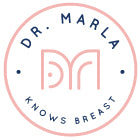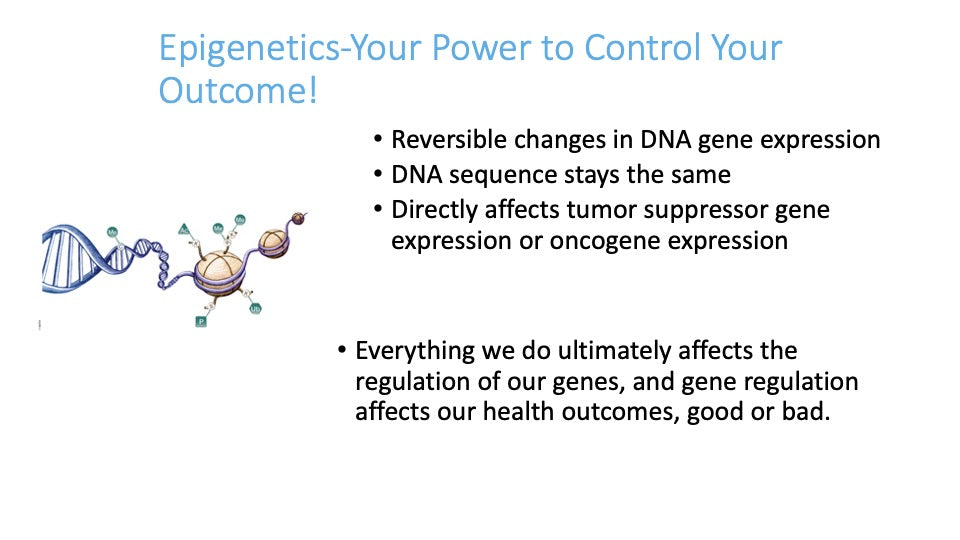Epigenetics
Bulletpoints:
- Only 5-10% of cancers are related to a genetic mutation. That means that 90-95% of cancers are related to or influenced by environment and lifestyle.
- Epigenetics gives you the power to influence your risk of cancer development through your control of lifestyle choices and to some extent environment.
- You have the ability to change your gene expression for health promotion or health harm. The power is in your hands.
What Is Epigenetics? And How Can It Contribute to Disease Development?
Most people know that diseases like cancer, diabetes, and heart disease are related to our genes – this is why doctors always ask about family history. But genes alone do not make you sick.
In fact, only 5-10% of cancers are contributed to a genetic mutation. This means that 90-95% of cancer development is related to environment and lifestyle. Another critical factor, one that is even more important, is the way those genes are expressed in the body.
How Do Genes Work?
Every cell in our body has the same DNA, which we inherit from our biological mother and father. This DNA is packaged into genes that tell the body how to create specific proteins, which are the foundation of our cells, tissues, and organs.
The Human Genome Project estimates that there we have between 20,000 and 25,000 genes. Because there are many kinds of cells in the body (blood cells, skin cells, muscle cells, etc.), not every gene needs to be activated at once in every cell.
Gene expression is controlled within the body by various proteins such as hormones and transcription factors. Gene expression can also be strongly influenced by environmental factors and lifestyle choices like diet, drinking, or smoking.
Think about DNA as a massive instruction manual, and genes are the individual chapters. For example, if blood cells need to produce more hemoglobin (a protein that carries oxygen), it “refers to” (expresses) genes that produce hemoglobin.
Gene expression is one of the most powerful influencers in how our body looks and functions. The genetic code of our DNA is not changed under normal circumstances, but our body is constantly regulating the expression of certain genes to keep things running smoothly.
When gene expression goes wrong, whether that mean too much or too little gene expression of specific genes, many different diseases can result.
Epigenetics Is the Study of How Specific Genes Are Expressed
When we develop as fetuses in the womb, we start off as a blob of identical, undifferentiated cells. As we develop, epigenetics determines which cells will go to specific part of the body and modifies those cells to do their specific job.
In addition to regulation that happens within the body, epigenetics also includes external lifestyle factors that influence how our genes are expressed. Over time, these lifestyle factors produce chemical modifications to genes, called epigenetic markers.
So, while people have an unchanging genome, the grand total of all our genes, we also have an evolving and changing epigenome, or the sum of all chemical modifications made to the genome.
Modifications to the epigenome persist when cells divide and, in some cases, can even be passed down through generations. So, specific modifications to your grandmother’s genome may have been passed down to your mother and in turn passed onto you.
These so-called epigenetic changes to the genome that are passed from one generation to the next explain familial risk, which is the increased risk for a disease over family generations even when there is no genetic mutation detected that directly causes such disease.
There Are Different Types of Epigenetic Modifications
Epigenetic modifications can activate or deactivate genes without changing the actual genetic code. Most of them involve the addition of some sort of molecule to the DNA. Some of the types of chemical epigenetic modification include:
- Methylation: This is when small molecules called methyl groups are attached to points on the DNA molecule. This blocks the gene from being expressed. Studies show that cancer is often connected to uncontrolled methylation, which leads to an overexpression of oncogenes that contribute to cancer growth.
- Histone acetylation/deacetylation: This is the addition or removal of another type of small molecule to proteins that bind and package DNA. This can be used by the body to either activate or deactivate genes, and studies show that these modifications can contribute to leukemia and epithelial cancers.
- Phosphorylation: This is the addition of a phosphoryl group to DNA, and has been shown to have a role in cancer growth and progression.
- Ubiquitination: Unlike the above three modifications, this involves the addition of a whole protein (ubiquitin), which is a much larger molecule that is found in all organisms except bacteria. Ubiquitination helps suppress tumors, and aberrations in the process can lead to cancerous growth.
Epigenetic modifications are not inherently bad. They are an important part of the way bodies control gene expression, and that control can be beneficial or detrimental. However, the accumulation of too many detrimental epigenetic changes can lead to disease.
Importantly, with respect to cancer, epigenetics can directly influence the expression of two different classes of genes, tumor suppressor genes and oncogenes.
Tumor suppressor genes live up to their name by helping prevent cancer formation and growth. Oncogenes directly promote cancer growth or do so indirectly by hindering the expression of tumor suppressor genes.
While there are hereditary cancers based on mutations of the genetic sequence itself, such as the BRCA genetic mutation in breast cancer affecting DNA repair, recent studies suggest that mutations in DNA repair genes are infrequent.
Instead, altered protein expression that is likely the result of epigenetic modifications either blocks tumor suppressor activity or promotes oncogene activity.
Think of epigenetic modifications like a palette of paint and a blank canvas. You can paint something beautiful with good choices for your lifestyle and environment, or paint something much less pleasing with poor choices. Whatever your “painting” looks like right now, you can make it look better and better over time.
Epigenetic Modifications Can Come from Different Sources
Epigenetic modifications are a normal and often essential part of the life cycle of all organisms, but this does not mean they always happen automatically.
These modifications are often a result of the outside environment. The study of how external factors can influence the epigenome is called environmental epigenetics. One of the best examples of this in nature is the honey bee (Apis melifera).
Though queen bees look quite different from workers, there are no genetic differences between queens and workers. All bees begin their lives the same – as larvae.
The differences emerge when the female larvae are fed a diet of a special substance called royal jelly. Larvae who are fed royal jelly develop into queens, while normal female larvae become the workers who run the hive.
The precise details of how royal jelly produces queens are very complex, but scientists do know that it’s a process of epigenetic modification.
One study published in Genome Research in 2018 by Marek Wojciechowski from Queen Mary University of London found distinct patterns in epigenetic histone modifications in queen and worker honey bees. These modifications are thought to occur as a result of their royal diet.
Another study of nutrition's effects on development showed they could change the coat color of baby mice simply by feeding their mothers four common nutritional supplements before and during pregnancy and lactation. Color changes in mouse pup fur pigmentation were directly linked to alterations in DNA methylation.
Moreover, these four supplements lowered the offspring's susceptibility to obesity, diabetes and cancer. Pregnant mice that received dietary supplements with vitamin B12, folic acid, choline and betaine gave birth to babies with brown coats.
In contrast, pregnant mice that did not receive the nutritional supplements gave birth predominantly to mice with yellow coats.
These studies highlight the power of nutrition and nutraceuticals and are examples that what you regularly consume and expose yourself to can directly impact your health through gene expression modified by epigenetics.
Lastly, a study by Manel Esteller, director of the Cancer Epigenetics Laboratory at the Spanish National Cancer Center in Madrid, demonstrated the power of epigenetics. He and his colleagues evaluated 40 pairs of identical twins and reported that twins who were either young or who shared similar lifestyles and spent more years together had very similar DNA methylation and histone acetylation patterns.
However, older twins, especially those who had different lifestyles and had spent fewer years of their lives together, had much different epigenetics and gene expression patterns in many different tissues.
So epigenetic modifications are happening constantly, both from substances we are exposed to, but also from behaviors, stress, and lifestyle.
Epigenetic Modifications Are Passed Down to Future Generations
Epigenetic modifications happen during one’s lifetime based on our choices, but they are not necessarily limited to an individual. Modifications are often passed down to future generations. This is one way that family history can affect your risk for developing diseases like cancer.
Lab experiments with mice have demonstrated this repeatedly. One prominent researcher working in this field is Michael Skinner, a professor of molecular biosciences and director of the Center for Reproductive Biology at Washington State University.
In the June 2005 issue of Science, he and his team described how exposing pregnant mice to high concentrations of a toxic insecticide and fungicide lead to decreased sperm production and infertility in the male pups.
But the effects did not stop at that generation. 90% of four subsequent generations of mice had the same issues, showing the persistence of epigenetic changes.
What Does Epigenetics Have to Do with Diseases Like Cancer?
Epigenetics is emerging as a critical factor in many diseases. Recent research is demonstrating that a major reason that family history is such an important factor in predicting diseases is because of inherited epigenetic modifications.
For example, many studies show that epigenetics is a factor in cardiovascular disease. So, it’s likely that lifestyle choices that contribute to heart disease, like poor diet or lack of exercise, can influence future generations.
The same has been shown for cancer. In this one example (of many), DNA methylation and histone modifications in cells interfere with their ability to control division, leading to the growth of cancerous tumors.
The implication of this knowledge to disease prevention is a bit of a mixed bag. On one hand, some epigenetic modifications are inherited from our parents, so we can be predisposed to certain diseases.
On the other hand, the important role epigenetics plays in disease development gives us the power to control our health and even change predisposition to certain diseases inherited through epigenetic modifications.
In addition, healthy lifestyle choices reduce the likelihood that we’ll pick up (or carry on) unwanted epigenetic modifications that lead to disease and pass them down to future generations.
You Can Change You Gene Expression with Healthy Lifestyle Choices
Epigenetics is the why behind what we do for our health.
We have long been told that healthy lifestyle choices like maintaining a healthy diet, not smoking, exercising regularly, and limiting alcohol consumption are important in preventing diseases like cancer and cardiovascular disease.
But the “why” can seem so non-specific, nebulous, and random. Knowing that epigenetics is the way, your way, to reduce your risk for numerous diseases hopefully will motivate you to dive deep into a healthy lifestyle.
For patients with a cancer diagnosis already, lifestyle changes can help prevent recurrence of cancer by helping them gain control of micro-metastatic cells, or tiny pockets of cancerous cells that have moved away from the original cancer site.In some cases, a well-supported immune system can even eradicate cancer entirely.
You have the ability to change your gene expression for health promotion or health harm. The power is in your hands!

